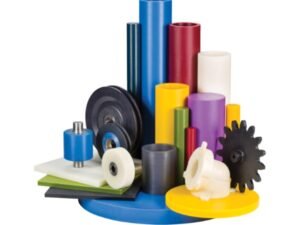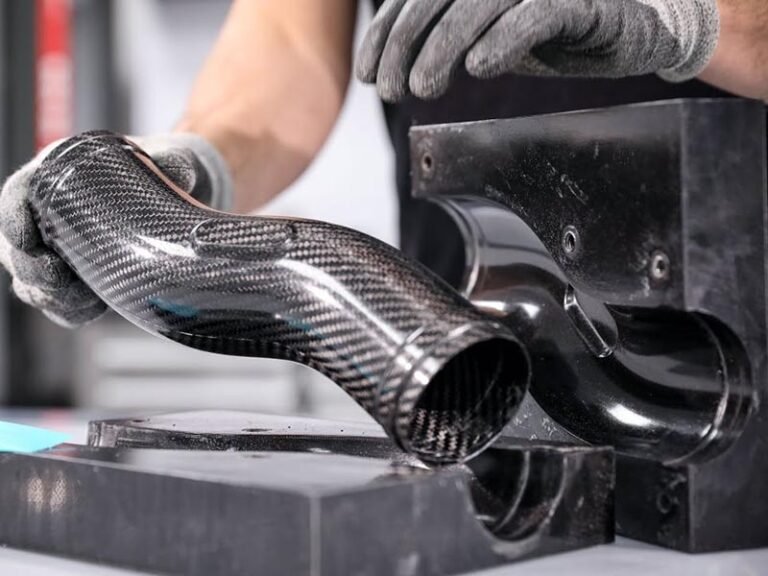Casting nylon is a high performance polyamide and it is known for its strength, versatility, and adaptability across applications. This article will explore the essence of casting nylong, the production process, types, and advantages.
What is Casting Nylon?

Casting nylon, a form of polyamide (typically Nylon 6), is an engineering plastic created through a monomer casting process. The material is known for its durability, low friction, and exceptional wear resistance.
Monomers is combined with catalysts. then they are heated and poured into custom molds under controlled conditions. Inside the closed mold, the monomer chemically reacts at controlled temperatures, solidifying into tough, crystalline nylon material. Once polymerization is complete, the molded part cools and solidifies further before being ejected from the mold. The cast nylon parts may be machined, polished, or finished as needed for the application.
Different Types of Cast Nylon Material
There are several types of cast nylon materials, each engineered for specific performance characteristics:
- Cast Nylon 6 (PA 6): The most common nylon cast material, offering excellent strength, abrasion resistance, and fatigue resistance. They mostly applied in industrial gears, bearings, and heavy-duty components.
- Cast Nylon 66 (PA 66): Known for higher heat resistance and mechanical strength, particularly suitable for applications subject to high temperatures.
- Cast Nylon 12 (PA 12): More flexible and resistant to chemical attack, used in environments requiring high chemical stability and impact resistance.
- Cast Nylon 11 (PA 11): Developed for low moisture absorption and flexibility, suitable for applications involving water exposure.
- Specialty Cast Nylons: These include variations with added lubricants, fillers, or FDA-compliant grades for food processing uses, enhancing self-lubrication and chemical resistance.
Advantages of Casting Nylon Process

Casting nylon process offers several advantages as bellow:
Complex Shape Capability
The casting process allows for the production of intricate and custom shapes by pouring liquid monomer directly into molds, enabling designs that are difficult or impossible with extrusion or injection molding.
Large Part Production
Casting can produce large components such as thick sheets, rods, or oversized parts without requiring secondary joining processes.
Low Internal Stress
The polymerization process in casting occurs slowly within the mold, resulting in parts with minimal residual stresses, reducing warping or cracking.
Cost-Effective for Low Volumes
Casting nylon is economical for small to medium production runs or custom parts, as it requires less expensive tooling.
Less Material Wasting
Parts can be cast very close to their final dimensions, reducing the need for extensive machining or finishing, which saves time and material costs.
Flexibility in Additives
During the casting process, additives like lubricants (e.g., molybdenum disulfide), stabilizers, or reinforcements can be easily incorporated to tailor the material properties for specific applications.
High Surface Quality
Cast nylon parts often have a smoother surface finish directly from the mold, reducing the need for post-processing compared to extruded nylon.
Thick Cross-Section Capability
The casting process allows for uniform polymerization in thick sections, avoiding defects like voids or sink marks common in other molding processes.
Cast Nylon vs. Extruded Nylon
While both casting nylon and extruded nylon are polyamides, their production methods and properties differ significantly.
| Feature | Cast Nylon Material | Extruded Nylon Material |
|---|---|---|
| Manufacturing Process | Chemical polymerization casting of liquid monomer | Melting and forcing polymer pellets through a die |
| Internal Stress | Low, due to controlled polymerization and cooling | Higher, caused by melt extrusion and rapid cooling |
| Mechanical Strength | Higher tensile and compressive strength | Generally lower strength |
| Dimensional Stability | Excellent, consistent dimensions | Moderate, prone to warpage |
| Surface Finish | Smooth, less porous | May have minor surface irregularities |
| Typical Applications | Gears, bushings, rollers, heavy machinery parts | Flexible parts, low-load components, textiles |
| Cost | Higher raw material and processing cost | Generally more economical |




